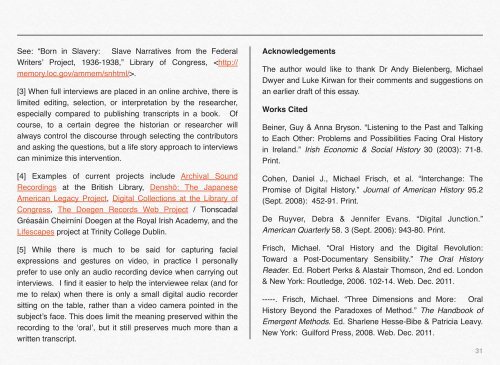Digital Arts & Humanities - Scholarly Reflections - James O'Sullivan
Digital Arts & Humanities - Scholarly Reflections - James O'Sullivan
Digital Arts & Humanities - Scholarly Reflections - James O'Sullivan
Create successful ePaper yourself
Turn your PDF publications into a flip-book with our unique Google optimized e-Paper software.
See: “Born in Slavery: Slave Narratives from the Federal<br />
Writers’ Project, 1936-1938,” Library of Congress, .<br />
[3] When full interviews are placed in an online archive, there is<br />
limited editing, selection, or interpretation by the researcher,<br />
especially compared to publishing transcripts in a book. Of<br />
course, to a certain degree the historian or researcher will<br />
always control the discourse through selecting the contributors<br />
and asking the questions, but a life story approach to interviews<br />
can minimize this intervention.<br />
[4] Examples of current projects include Archival Sound<br />
Recordings at the British Library, Denshō: The Japanese<br />
American Legacy Project, <strong>Digital</strong> Collections at the Library of<br />
Congress, The Doegen Records Web Project / Tionscadal<br />
Gréasáin Cheirníní Doegen at the Royal Irish Academy, and the<br />
Lifescapes project at Trinity College Dublin.<br />
[5] While there is much to be said for capturing facial<br />
expressions and gestures on video, in practice I personally<br />
prefer to use only an audio recording device when carrying out<br />
interviews. I find it easier to help the interviewee relax (and for<br />
me to relax) when there is only a small digital audio recorder<br />
sitting on the table, rather than a video camera pointed in the<br />
subject’s face. This does limit the meaning preserved within the<br />
recording to the ‘oral’, but it still preserves much more than a<br />
written transcript.<br />
Acknowledgements<br />
The author would like to thank Dr Andy Bielenberg, Michael<br />
Dwyer and Luke Kirwan for their comments and suggestions on<br />
an earlier draft of this essay.<br />
Works Cited<br />
Beiner, Guy & Anna Bryson. “Listening to the Past and Talking<br />
to Each Other: Problems and Possibilities Facing Oral History<br />
in Ireland.” Irish Economic & Social History 30 (2003): 71-8.<br />
Print.<br />
Cohen, Daniel J., Michael Frisch, et al. “Interchange: The<br />
Promise of <strong>Digital</strong> History.” Journal of American History 95.2<br />
(Sept. 2008): 452-91. Print.<br />
De Ruyver, Debra & Jennifer Evans. “<strong>Digital</strong> Junction.”<br />
American Quarterly 58. 3 (Sept. 2006): 943-80. Print.<br />
Frisch, Michael. “Oral History and the <strong>Digital</strong> Revolution:<br />
Toward a Post-Documentary Sensibility.” The Oral History<br />
Reader. Ed. Robert Perks & Alastair Thomson, 2nd ed. London<br />
& New York: Routledge, 2006. 102-14. Web. Dec. 2011.<br />
-----. Frisch, Michael. “Three Dimensions and More: Oral<br />
History Beyond the Paradoxes of Method.” The Handbook of<br />
Emergent Methods. Ed. Sharlene Hesse-Bibe & Patricia Leavy.<br />
New York: Guilford Press, 2008. Web. Dec. 2011.<br />
31


